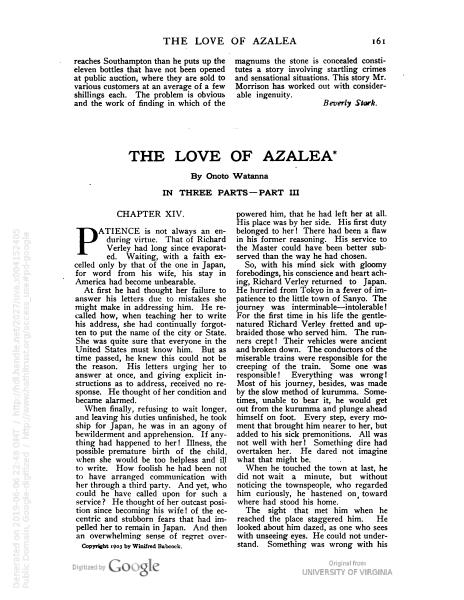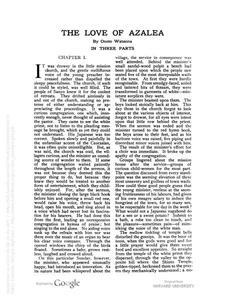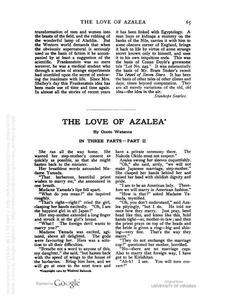The Love of Azalea
In Three Parts—Part III
CHAPTER XIV.
Patience is not always an enduring virtue. That of Richard Verley had long since evaporated. Waiting, with a faith excelled only by that of the one in Japan, for word from his wife, his stay in America had become unbearable. At first he had thought her failure to answer his letters due to mistakes she might make in addressing him. He recalled how, when teaching her to write his address, she had continually forgotten to put the name of the city or State. She was quite sure that everyone in the United States must know him. But as time passed, he knew this could not be the reason. His letters urging her to answer at once, and giving explicit instructions as to address, received no response. He thought of her condition and became alarmed.
When finally, refusing to wait longer, and leaving his duties unfinished, he took ship for Japan, he was in an agony of bewilderment and apprehension. If anything had happened to her! Illness, the possible premature birth of the child, when she would be too helpless and ill to write. How foolish he had been not to have arranged communication with her through a third party. And yet, who could he have called upon for such a service? He thought of her outcast position since becoming his wife! of the eccentric and stubborn fears that had impelled her to remain in Japan. And then an overwhelming sense of regret overpowered him, that he had left her at all. His place was by her side. His first duty belonged to her! There had been a flaw in his former reasoning. His service to the Master could have been better subserved than the way he had chosen.
So, with his mind sick with gloomy forebodings, his conscience and heart aching, Richard Verley returned to Japan. He hurried from Tokyo in a fever of impatience to the little town of Sanyo. The journey was interminable—-intolerable! For the first time in his life the gentle-natured Richard Verley fretted and upbraided those who served him. The runners crept! Their vehicles were ancient and broken down. The conductors of the miserable trains were responsible for the creeping of the train. Some one was responsible! Everything was wrong! Most of his journey, besides, was made by the slow method of kurumma. Sometimes, unable to bear it, he would get out from the kurumma and plunge ahead himself on foot. Every step, every moment that brought him nearer to her, but added to his sick premonitions. All was not well with her! Something dire had overtaken her. He dared not imagine what that might be.
When he touched the town at last, he did not wait a minute, but without noticing the townspeople, who regarded him curiously, he hastened on toward where had stood his home.
The sight that met him when he reached the place staggered him. He looked about him dazed, as one who sees with unseeing eyes. He could not understand. Something was wrong with his
162sight—-his head, he told himself. Where once had stood the little flower-embowered home, there was nothing but a heap of broken planks and débris, the melancholy débris of a fallen house.
Snow was falling slowly and turning to water as it fell. The trees were leafless. Where the sunny, flowering bushes had stood about the tiny cottage, there were only the black stalks standing up in barren nakedness. Desolation and tragedy seemed heavy everywhere. He blundered forward a few steps, his hand to his eyes.
“A mistake somewhere,” he muttered, “I have lost my way. This is not the place—-this is not—-and yet!”
He uncovered his eyes and again cast them about, slowly. The surroundings were as familiar to him as the face of a mother, and over there, the length of an iris field away, there was the church—-his church! He turned in its direction.
At the church door he fumbled with key to the lock. It turned easily enough, but when he pushed the door inward it did not move. Then he discovered the reason. The door was nailed to. Panic and frenzy swept over him in a flood. He began frantically pounding upon the door, shaking it by the handle, pushing against it with his shoulder, beating upon its panelling with his fists, and tearing at the hinges with his fingers. The blood was in his head. He could neither see nor hear. Only that sensation of horrible foreboding and certainty of disaster pervaded his whole being.
A temple bell began to tinkle, lazily, insistently. Small black birds, cawing as they flew, swept close over his head, hastening toward their night home in the woods. The rain descended heavily, noiselessly. The shadows darkened dully.
“What am I doing?” the minister suddenly asked himself, and paused in his efforts to break the church door. “She is not here! My fears are driving me mad. How do I know that harm has come to her? I must not trust to the phantoms of my imagination. God is good, good!” He walked out a few paces, thinking dazedly. Then with a sudden resolution to seek her in the village, he began to descend the hill. His step was more hopeful. He tried to keep up his courage, but as he made his way along his lips moved ceaselessly in prayer.
He went first of all to her step-mother’s house. Here in the miserable, drizzling rain he stood outside the house, none bidding him enter in response to his knock. Yet all through the house he could hear the sounds of his coming announced.
A woman shrieked his name. Some one called back in a loud whisper which penetrated through the paper shoji walls:
“The Kirishitan!”
Then he heard the pattering of hurried steps and the jabbering of voices. Soon he was conscious of the fact that eyes were regarding him from a dozen of wall holes. He knocked again, louder, and one within, unseen, called in insolent tone:
“Begone! The curses of Shaka upon you!”
He told himself his ears deceived him. His knowledge of Japanese confused the language surely. He knocked again, and again, each time louder. Again the voice within:
“Who is it knocks?”
He spoke distinctly in pure Japanese. “I am Verley-sama, your daughter’s husband. I have come to seek my wife.”
There was silence, and then:
“We do not understand your language.”
He repeated his words slowly, patiently, enunciating each Japasese syllable distinctly. But again came the reply:
“We do not understand.”
He recognised now the voice. It was that of the step-mother of his wife, Madame Yamada. She had some reason for her lies. He was positive she understood his Japanese.
“My words are plain,” he said. “I have come to seek my wife.”
“She is not here.” The voice was raised angrily now. “Seek elsewhere, foreign devil!”
He ignored the insult and persisted doggedly.
“Where shall I seek?”
Someone laughed jeeringly within, and then the taunting words floated out:
“Ask of the gods, priest of the evil one.”
“I ask of you,” he said hoarsely. “I shall not leave your house till you reply.”
He heard the sound as of one moving with angry and impetuous haste within, pushing whatever stood in her path aside. Madame Yamada thrust aside the sliding shoji door and stood in the opening.
163
Her words were mockingly sarcastic, and she bowed with extravagance.
“In what way can the humblest one serve the mightiest?”
“My wife?” he demanded. “Speak, woman, where is she!”
She smiled inscrutably, but as he went nearer to her the sneering lines about her face deepened, revealing all her bitter detestation of the Kirishitan.
“You will be punished if you have injured her,” he said.
“What will the wise and mighty Excellency do?”
“I will have you arrested. You will be forced to answer.”
“So!”
She drew in her breath with the hissing sound peculiar to the Japanese. Then she drew the skirt of her kimona closely about her, and turned to re-enter the house. He caught and held her by the sleeve and then she stood still, her eyes half closed.
“Answer me !” he cried.
“It is not I who am the keeper of the outcast. You come to the wrong house, sei-yo-gin. Seek elsewhere.”
Still he held her, and she could not free herself, though she made effort to do so. Thus held, in angry durance she stood.
“You are her mother-in-law. You know where she is. I will not release you till you speak.”
“Go to Okido-sama, the Nakoda,” she said sullenly.
“Okido-sama?”
“He knows!” said she.
He let her arm go and she, free, pushed the shoji viciously closed, attempting to crush his hand in the opening.
“Okido-sama!” he repeated thoughtfully, “Okido-sama, the Nakoda!”
CHAPTER XV.
Okido-sama, the Nakoda, was squatting comfortably upon his heels eating his warm rice and fish when Richard Verley came to his door. During the absence of the minister, Okido had apparently prospered. His house was new. His servants many and obsequious. The one who hastened to respond to the minister’s knock did not recognise him in the darkened rainy evening. He perceived only a barbarian and, knowing his master’s trade, saw in him a possible customer.
Verley was shown into the guest chamber. Shortly came Okido to the room, fat and oily, discreetly wiping the rice-crumbs from his thick lips with the back of his hands. He was bowing grotesquely at every step as he came toward the minister, but when he finally lifted his head and saw who his guest was, he gave such a startled jump that he fell in a heap on the floor, and there he remained, trembling with fright. Instantly Verley was convinced that the man knew all about his wife, her whereabouts, the horrible fate that must have befallen her.
“My wife! You know her whereabouts?”
“Your wife!” stammered the cringing Okido. “What was her august name, Excellency?”
“You know it. Answer at once.”
“Excellency is honourably mistaken. I do not know the name of the exalted one’s wife.”
Verley, with no effort at gentleness, seized him by the shoulder of his hakama, and as he spoke shook the trembling wretch threateningly.
“You will answer my question. Understand.”
The Nakoda began to whimper, drawing his sleeve across his eyes and furtively looking about for a means of escape.
He was poor man, very poor, harmless man. Surely Excellency would not hurt him.
“Quick. I am waiting.”
“So many people I know,” whimpered the Nakoda. “How I can remember one woman among them all.”
“You do not need to remember. You already know of whom I speak.”
“She was a tall woman with thin cheeks, yes?” he inquired with attempted smile.
The minister answered by tightening his grip upon the man’s collar, and pushing his knuckles hard upon the neck. Okido shrunk fearfully from the large hand of the white man. He felt sure it would hurt hard. After a moment:
“She was fat—-yes, surely fat!”
“That will do.”
He slipped down to the minister’s feet and beat his head, seeking to shake off that hand at his neck.
“Listen,” said Richard Verley,
“I will 164give you five minutes in which to answer. At the end of that time—-”
“Excellency will not beat a poor man Ah, surely not!”
“Excellency will kick the life out of you.”
“No, no.” Okido cast a fearful glance at the minister’s boots. “I will speak truth. Surely!”
At those words, the minister for a moment forgot his caution, and slackened the tension at the man’s neck. But in that moment Okido was free. He had slipped not only from the minister’s grip, but had disappeared as if by magic through the wall against which he had crouched.
Richard Verley was alone. He strode from one to the other of the four walls of the shoji. He threw them all apart and penetrated into the interior apartments. The servants fled before him with the speed of wings and disappeared as silently and swiftly as their master. Suddenly he found himself on the door step. He went down slowly into the street.
Someone called his name. “Excellency ! Master—sir!”
He turned quickly and saw the woman Natsu following him.
Her name burst in a cry from his lips, and he rushed toward her. “Natsu! You! Your mistress—-quick, how—-where is she?”
Her eyes shifted from his face. She covered her own with her sleeve, and thus she stood, the picture of sorrow.
The minister stared at her, horrified. When he spoke his voice was strange.
“I understand,” he said. “She is—-.”
And so she had died—-his little, laughing Azalea, his beautiful child-wife, had died while he was away from her. He put out his hands blindly, as the inclination to faint overcame him. He hardly understood the words the woman spoke.
“Oh, master, master, master!”
But the woman’s voice recalled him. He stared at her mechanically. Mechanically he spoke.
“I understand,” he said. “She is dead.”
“Dead!” repeated the woman, and shook her head. “No, no, not dead; better that than that what is, O master—sir!”
“Not dead!” His hands unclinched. His fears had lent phantoms to his imagination. “Alive! Why, then all was well.” His thought escaped his lips, and the woman answered:
“Better death than sin, O master.”
He could have laughed. What! Was this servant of his trying to frighten him with her old jealous tales of the insincerity of his wife’s conversion. The sins of Azalea were microscopic.
“Come, Natsu, let us go to her,” he said impatiently. “Why do you look at me in that way? Are you, too, seeking to hide her whereabouts from me?”
“No, master, but if I take you thither, you will curse me for my evil offices.”
“I don’t understand you, Natsu. You always were a mystery to me. But now, come. Where is she?”
“Oh, master, seek her not!”
As he still sought to draw her along with him, she slipped down to his feet and stayed his progress with her head there.
“Why do you seek to deceive me, Natsu? What is the matter with you ? Why do you act thus? What has happened to my wife? Speak!”
Still kneeling, with her head at his feet, she answered:
“She has become wife to Matsuda Isami, Oh, Highness.”
As he did not speak or seem to comprehend her words, she repeated them. And then, as still he made no sound, she said:
“Isami is richest man in Sanyo. What is there he connot buy?”
She was seized by the shoulders in a savage grip. Her very teeth smote together with the shock of his grasp.
“You lie!” he cried. “You lie! Vile thing, you lie, I say!”
CHAPTER XVI.
It was the evening of the return of Richard Verley to Sanyo. Azalea was sitting passively under the hands of the maid, Natsu, having her shining black hair brushed and twisted into the elaborate mode approved by Matsuda. Word had come into the room where thus far she had been kept a prisoner, ordering her to prepare for the wedding ceremony. Whatever her inward emotions, now as she sat under the hands of the woman, she showed only a stoical calm. That nameless antagonism which had always existed between these two had become a deeper thing during these days in the house of Matsuda. Instinctively
165Azalea knew the woman for an enemy, and accordingly feared and hated her. Though forced to submit to the woman’s attendance, yet she would not condescend a word either of entreaty or command. Matsuda held her destiny in his hand. He could rob her of her child. He had kept his word and taught her lips to frame themselves to meeker words. But the woman—-Natsu-san—-to her at least she need not kneel. Now on this day as Natsu dressed her mistress, Azalea showed no interest in the other’s evident agitation, despite the fact that the woman showed unusual signs of being discomposed. Finally as the silence became unbearable to her, the woman broke it with strange words:
“Mistress,” she said, “the man Okido is waiting below in the guest room.”
Azalea inclined her head, but made no comment. Okido, like all other people, was of no interest to her. The woman lowered her voice.
“I have taken a patch from your floor, mistress. If you will put your head to it you will hear what he has to say to the master.”
Azalea’s glittering eyes looked at the patch uplifted by the woman. Still she remained silent.
The woman’s insidious voice continued carefully:
“Mistress, you have heard the ancient saying of the samurai: ‘To die with honour when one can no longer live with honour’.”
The girl beneath her hands did not stir, nor did she deign to turn her head to where the woman pointed. The shorter sword of the samurai was set close to the patch. It was covered with a white cloth—- cloth of honourable death. The woman had provided the wife of the white priest with a means of escape. Yet she had judged wrongly. Azalea was not merely the daughter of samurai. She was the wife of a Christian. Life could not be taken so easily as the woman supposed. The code of the samurai pointed out that death was better than dishonour. The new religion said nothing on this matter. It simply forbade the suicide.
The woman, her task completed, arose and brought a mirror to Azalea, who, still silent, stared fixedly and unseeingly at the reflected face. She started somewhat as the maid’s lips touched her ears, and in the glass she saw the fat red face close to her own.
“Mistress, to-day if you listen you will learn the full extent of your folly and the dupe you have been to us all.”
The mirror slipped from Azalea’s hands. She reached them up suddenly and pushed them against the face of the maid. Her nails sank into the puffed fatness of the woman’s cheeks.
“Your touch offends me,” she said. “Come not so near, low-born one.”
With a cry of rage the woman sprang back, clasping her hands over her hurt cheeks. Then, muttering, she shuffled toward the doors. There she paused vindictively.
“You are a peacock now, Madame Azalea, but your feathers will look less proud and pretty when you learn what they have cost you. You disdained the servant of the white Highness, and taught him to do likewise. But the lowly one was in his service long before his eyes desired you. Even a snake crawling in the grass may strike a revenge. There is nothing too small or lowly to bite.”
Azalea did not move or deign to turn her head, even after the woman had gone, and she could hear her glide along the hall. For a long time she sat in silence. Once she looked with fearful stealth at the opening in the floor, but she did not look for long. There was nothing further for her to hear, she told herself. Who knew already better than herself the extent of her debasement?
CHAPTER XVII.
Okido bowed to the floor before the illustrious Matsuda Isami. Knowing well the nature and temper of his employer, he did not waste much time upon courtesies, but went briefly to the object of his visit.
“He has returned,” he said.
Matsuda seized Okido by the shoulders, hurting him with the grip of his fingers.
“What is that you say?”
“The white beast—-”
“Ah!” Matsuda’s grasp relaxed. He took several strides across the room, then stopped before an opened shoji and drummed upon the panelling.
“Well, then—-what of that?” he asked.
166
Okido came to his elbow and whispered agitatively:
“But she will see him. It cannot be helped.”
Matsuda laughed diabolically.
“I have complete command over her eyes, my good Okido. Have you not yet observed how she is conquered?”
Okido shook his head dubiously.
“But should Mr. Beast come in person to your house?”
“We have means of dealing with barbarous dogs,” quoth Matsuda contemptuously, “and the police of this town respect the authority of their masters.”
“But the letters, most Exalted? He will make inquiry.”
“Pah! What of it? Will it be the first time that mail has been lost between this country and America?”
“—-so much mail.” Okido moved uneasily. “Excellency, I am afraid of the heavy boot of the barbarian. It was I who kept back for you the letters from the barbarian to the woman. It is said his government is powerful—-revengeful. Let me beseech you to give me a sufficient sum to get swiftly away.”
“On the contrary. You must stay here and help me. Besides, you forget the woman Natsu was the one who held the letters. They should weight her sleeves, not yours.”
“Yet, good Excellency, I was the carrier, and—-”
“You delivered the letters?”
“Not to the one to whom they were addressed, but to the servant of the foreign devil, who, Exalted, declares she gave them to you.”
Matsuda laughed unpleasantly.
“Huh! Then it is my sleeves which are weighted!”
In the room above the speakers the woman Azalea watched over the open patch in the floor. Her face beneath the heavy rouge plastered lately upon it by the woman Natsu-san was a ghastly white. Her bosom was heaving with her quick breathing, her glittering eyes were horrible to look upon. She had heard and understood every word of the dialogue, and now she crouched in the attitude of a feline about to spring, looking down with dreadful eyes upon the head of that one below. Yet in this moment of frenzy Azalea did not scream or faint. Now the strength of her samurai ancestors surged upward through her veins, tingling her whole being. Everything else was blotted out—-forgotten. She obeyed only the hereditary instinct of the samurai—-an instinct for revenge. When she could move from her crouching position by the opening, she arose with silent swiftness. She stood straight and still, only her eyes slowly travelling about the room as though seeking some object.
Suddenly she found it—-the sword! Her small hands gripped its blade and felt its keenness. Then she hid it in the folds of her kimona, and, her colourless lips close pressed together, she passed soundlessly from the room down the little flight of steps and through the hall. Suddenly and almost soundlessly she pushed aside the shoji of the ozashishi. Now she stood between the opening, her eyes upon the startled ones of Matsuda Isami.
In a flash he understood that somehow she had heard and knew now the truth. His servants had grown careless. She had escaped from the trap he had set for her. Vengeance was written in every line of her rigid form. He could almost see the twitching of her fingers upon the concealed weapon in her sleeve. With a cunning worthy of the man he advanced a step toward her, hoping in this way to precipitate her attack, and when she should spring upon him he would trip her. He said as he advanced:
“Little dove, you look pale to-day—-why—-”
As the sword flashed upward he dashed to one side and then slipped under its guard. His heavy hands locked together descended crushingly upon her head. She threw back her arms, the sword slipping from her hand. Then she fell backward.
Across her fallen body Matsuda Isami and Okido stared at each other. The latter was shivering as though afflicted with ague. He kept repeating over and over between his chattering teeth: “Shaka! Shaka! Shaka!”
“Do not speak so loud,” hoarsely commanded the other, “or, by all the gods, I will send you to join her.”
The little Nakoda shrank and shivered, beat his head upon the floor.
Matsuda strode to the dividing doors. He called the woman Natsu-san as he clapped his hands. She came hurrying
167along the hall and stood open-mouthed on the threshold, looking in on that outstretched form. Her eyes lifted in question to the man Matsuda.
“Hear me,” he whispered hoarsely “The woman has fallen in some swoon. We will tie her devil offspring to her back and carry her up to the place where she belongs. Give me your aid, good Natsu, and I will marry you instead.”
CHAPTER XVIII.
Save for the moving of the trees in the early winter air, there was only silence on the hill, where stood the little mission house, but a ghostly moon pushed its rays through the boughs of the trees, glistened on the panes of the church and silvered the interior.
The rows of dark pews shone up stiffly in the moonlit church, and a great white beam glimmered across the pulpit, shaped as a cross.
Azalea crawled on her hands and knees up one of the aisles of the church. She was moaning to herself as she made her painful journey along.
“—-to touch his God!” she said, “for even the evil are forgiven.”
Now she was before the little pulpit, her weak hands upon it. She sighed at its contact, and a feeling of intense calm and rest seemed to flood her being, but she could not support herself against the pulpit structure, even upon her knees, so weak was she and so nauseating the pain in her head. Gradually she sank downward, lower and lower, till her face touched the floor. Then she spread out her arms, and lay very still, face downward.
It was past midnight when Richard Verley came back to the door of the little mission house. His old-time beggar protégé Gonji accompanied him. From the boy the minister had learned much—-all, indeed—-concerning his wife. He knew now what had befallen her so soon after the birth of her child; her homeless condition, her vain efforts to obtain work, her wanderings and terrible privations, and then the gossip of the town. People whispered that as a wraith she had returned to Sanyo and had passed as a shadow into the house of Matsuda Isami. The feelings of the husband can be imagined. Such was the temperament of Richard Verley that, even the knowledge in his mind of her probable relations to the man Isami, there was no thought of blame for her in his heart. Indeed, the strongest emotion that swayed him was remorse of the deepest and bitterest. He should never have left her. He should have either forced her to accompany him or have remained in Japan with her.
His first impulse now was that of the man-brute, the desire to kill with his own hands the one who had injured him and his so terribly. But a calmer, higher instinct triumphed—-the instinct of the man of strong spirituality to turn to that One who had never failed him in time of stress. Something seemed to force his footsteps toward his little house of prayer. So dazed and numb was the condition of his mind at this time, however, that he did not even notice when he came to the door of the church that it was no longer nailed to and boarded up.
Richard Verley entered the church alone. The boy was afraid to enter. He did not know what evil spirit might be lurking in the night within the white priest’s temple. He stretched himself out on the doorstep of the church and went to sleep there.
It was very dark within now, for the moon was gone. For a moment the minister paused irresolute. Then his hand touched the side of a seat. He sat down mechanically. Suddenly he covered his face with his hands, and tried to pray, but his prayer was wordless. For how long he sat thus he could not have told. It might have been the length of half the night, for when he uncovered his eyes again things seemed changed about him. The faint glimmer of the dawn lent its first grey light. He looked about him—-at the melancholy church interior, his eyes travelling slowly and painfully over the dusty pews and then upward toward the little pulpit cross where he had spoken so often. A patch of colour caught his eyes and held them. He thought he dreamed and turned his glance away, but, fascinated, his eyes came back to that bit of colour there at the foot of the pulpit.
He started up with a loud cry. A moment only, and he was beside her, his trembling hands touching upon her. Something stirred upon her back and he saw the round head of the baby. Its
168eyes were wide open now and looking at him with interest. Like most Japanese babies, it was a grave, mute little mite, but its eyes were large and, like his own mother’s, blue in colour. He knew it for his own child, though he could not see the face of the mother who lay so very still. Some blessed instinct guided his staggering feet to the door. He aroused the sleeping Gonji, and put into his arms the child. Then he went back into the church.
She had told him in those other days, so many times, that his voice would waken her from the very sleep of death. When her eyes looked up into his face she would not close them though they ached with weariness. She even smiled at his broken repetitions of her name.
“I do not know how it is you are here,” he said, “but here you are—-in my arms, my wife, and it is enough.”
Her voice was weak, but inexpressibly sweet.
“It is enough,” she said.
[THE END.]





